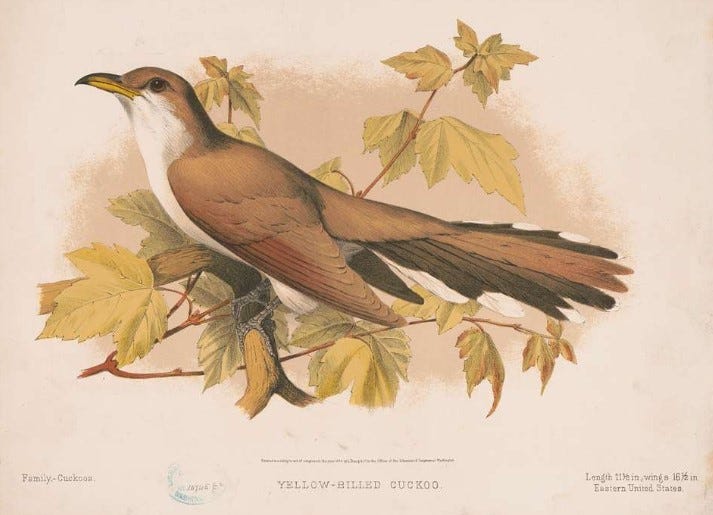I’ve probably mentioned it here sometime or other, that I’ve got a sharp ear for distinguishing the calls of birds. I can tell there’s an oriole in the neighborhood at a single note — the beautiful loud clear whistle, which Mr. Oriole may repeat several times in the spring, till he bursts out in his lovely phrases of song. I miss the orioles, that don’t make it up here where we are in New Hampshire, as I miss the mockingbirds, only one of which I saw and heard this far north, in seven years. When I first started listening and watching for birds, I’d occasionally seek them out, like the boy in today’s Poem of the Week, the poet Wordsworth as he remembers himself in years long past. Most of the time, I didn’t find what I went out to look for, though sometimes I enjoyed the more delightful pleasure of finding what I was not looking for, experiencing it as a sheer gift. That happened one day when my family and my sister Lisa and her family went to Hawk Mountain, in Pennsylvania, and instead of hawks we got a glorious look at a pair of indigo buntings in mating season. One day, Debra and I were on a mountain overlooking the town of Front Royal, in Virginia, taken there by our guide, the father of one of my good friends, and all at once we were surprised by the great flapping wings of Woody himself, the grand Pileated (the word means “crested”) Woodpecker.
I surely have mentioned that one of my hobbies is to collect and read bound volumes of popular magazines from about 1870 to 1920, and if you think about it, those decades were the age of really adventurous exploration of the earth. I’ve read an account of the jungles of Borneo (written by the father of the young man who led the expedition, and who did not make it out alive); a charming story by John Muir about how a camp mutt named Stickeen got him off the three-mile-long needle end of a glacier in the fog, with drops of hundreds of feet sheer down on each side; the day-book of a couple of boys who decided to bicycle from France to the Pacific Ocean; Helen Hunt Jackson, going to the ruined missions in California to search for elderly Indians who remembered the good life they had with the Fathers; people on the go. And there’s something in it all that stirs my heart, just as the final line of Tennyson’s most beloved poem, “Ulysses,” does: “To strive, to seek, to find, and not to yield.”
But must we always be seeking? Or, if we are seeking, isn’t it better sometimes to receive, rather than to dig something up by sheer force and cussedness? Consider that when you are relaxed, not in lassitude, but at peace, and when you let your mind be opened, you may not be what we’d call busy, but in reality you may be more active, more alert, more susceptible to beauty and goodness, than when you have your six-point-plan to accomplish something today. Here I’ll recommend to everybody a book that utterly changed my thinking about these things — it’s Joseph Pieper’s Leisure: The Basis of Culture.
Anyhow, the boy in Wordsworth’s poem hears the bright song of the cuckoo, and tries to find where the bird is. Some of those European cuckoos really do sound like they’re coming out of a German cuckoo clock; the yellow-billed cuckoo in eastern North America doesn’t have that call. The cuckoos, though, are a bit shy, so you might hear them all your life and never see them. And that’s the case with the poet here.
What is the good of not seeing? We might turn the tables, and ask, “Are there good things we can only receive, rather than fashioning for ourselves, or sweating to find them with diligent search? Children receive, with unembarrassed gratitude. Wordsworth here suggests that the song of the cuckoo makes him like a boy again, not just because he remembers what he was like, but because the song ushers him again into what I’ll call the real world — a real world of things beyond the material, a world in which God may speak to the soul in ways that words cannot capture. It is Wordsworth’s remarkable accomplishment, more than any English poet I know, and that’s high praise, to put into simple words this apprehension of the transcendent. Here he does it in the meter of a simple and pleasant ballad — not to be taken for granted. And all, from a cuckoo!
O blithe New-comer! I have heard, I hear thee and rejoice. O Cuckoo! shall I call thee Bird, Or but a wandering Voice? While I am lying on the grass Thy twofold shout I hear; From hill to hill it seems to pass, At once far off, and near. Though babbling only to the Vale Of sunshine and of flowers, Thou bringest unto me a tale Of visionary hours. Thrice welcome, darling of the Spring! Even yet thou art to me No bird, but an invisible thing, A voice, a mystery; The same whom in my school-boy days I listened to; that Cry Which made me look a thousand ways In bush, and tree, and sky. To seek thee did I often rove Through woods and on the green; And thou wert still a hope, a love; Still longed for, never seen. And I can listen to thee yet; Can lie upon the plain And listen, till I do beget That golden time again. O blessèd Bird! the earth we pace Again appears to be An unsubstantial, faery place; That is fit home for Thee!
Listen to this episode with a 7-day free trial
Subscribe to Word & Song by Anthony Esolen to listen to this post and get 7 days of free access to the full post archives.












